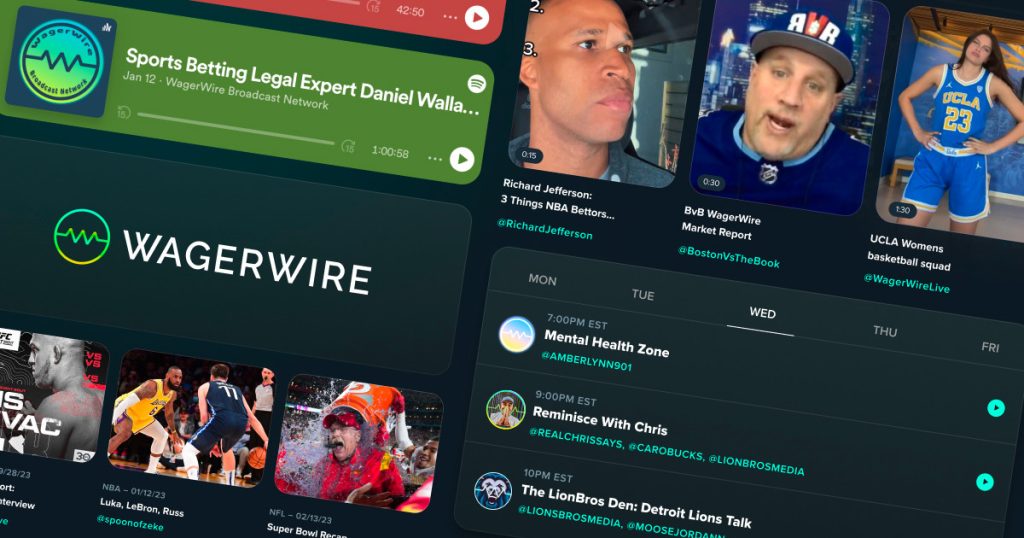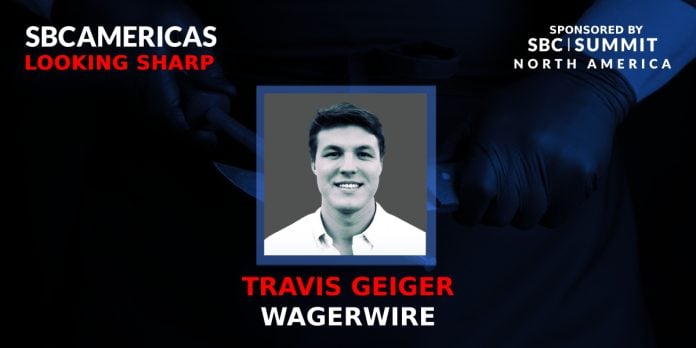In a vacuum, sports betting is a pretty solitary affair. Unless you tell someone what you bet, it can be your little secret. Yet, even a cursory glance at social media will tell you that sports betting has always been a communal affair. Be it #GamblingTwitter, Discord channels, or even TikTok, you can find people sharing bets, sharing takes, and sharing the experience of betting.
WagerWire creates spaces for women and mental health in betting
Travis Geiger, co-founder of WagerWire, understands the need for community and it is at the heart of what WagerWire offers. The site is an aftermarket venue to buy and sell bets but also utilizes community pages and Twitter Spaces to offer things like a Mental Health Happy Hour or a No Mansplaining Zone for women bettors.
“Mental Health Zone actually started with people talking about their team’s losses, and coming together around that. But it turned into actual talk therapy and once you have community, it’s a really powerful thing. A lot of these people don’t know where to go to talk stuff out with people,” he said.”
These spaces to blow off steam with people can relate with one another are important pieces of the puzzle, but at the heart of this community is a desire to learn to be more sharp.
“For me, being a sharp is about the journey. It’s an aspirational thing. People want to be sharps,” Geiger observed. “It’s actually a quote from the Bible that says iron sharpens iron, one person sharpens another and I think that has to do with everything with the betting community. Most people are learning from each other.”
There is social capital in helping the online betting community
Some of this education comes from a place of wanting to help people, but Geiger also notes that in the sharp community there is a social cache to parsing out wisdom about betting. For him, the motivation behind the engagement isn’t something to shun, even if it is fundamentally about impressing other people.
“There’s a lot of social capital in football, both in education and just in the sharing of action and picks, which should be embraced. There’s bragging in everything. Crypto, NFTS, all this stuff,” he said. “I think people are helping each other because it’s just more genuine than the book helping you and there’s social capital to be had if you’re out there helping people.”
Operators, affiliates, and media sites all pour money into efforts to build their own education platforms and be a part of the community of bettors learning to be better. However, even relatively new bettors are raising an eyebrow at the operator who will profit off their mistakes giving them advice. Geiger thinks this problem is more widespread than operators may realize.
Bettors hesitant to take advice directly from sportsbook operators
“When someone like FanDuel TV is giving you betting advice, do I go to FanDuel TV as my primary source of information? Or is it just kind of background noise that keeps me in kind of the betting ecosystem? I think that there’s a crisis where [operators] don’t want people to leave their app, so they’re putting content in but then the content that’s in it has an inherent pathway. So these people bounce around, and that’s why these communities are forming because people don’t know where to go, but they know who they can trust on an individual basis, and then communities kind of formed around that.”
Geiger cited Captain Jack Andrews, Sportsbook Consigliere, and Mike Tannenbaum as prime examples of people bettors are flocking to get independent information about how to become a sharper bettor. Their independence from sportsbooks give them credibility as unbiased sources then, in turn, their growing following signals to people that they are reliable resources.
Legislation about auditing content and creating systems for those who offer picks, for example, to post their records and the win rates made the rounds in a few states this year, even passing into law in Maryland. In the meantime, bettors are navigating a metaphorical minefield of people on social media claiming to be experts.
Geiger wants WagerWire to work with operators to create more objective content around their offering while maintaining the company content mantra of “for fans by fans.” WagerWire’s app integrates its social media and TikTok into its app along with user-generated content to not only help educate and create community but also address the issue of creating a sense of camaraderie without having to leave the app.

How do you create community while keeping people on the app to bet?
“We’re constantly looking at the new landscape of user experiences within sports betting to make sure there is an avenue to include social interaction as it’s vital to retention. Even with new and emerging capabilities, like in-game betting and microbetting, which require more immediate attention from the bettor, we work hand-in-hand with our partners to ensure social avenues are top of mind. For instance, our “for the fan by the fan” content is housed directly in our app, so the bettor’s second screen experience can be leveraged for interaction with content and betting simultaneously,” Geiger said.
Plus, the very idea of buying someone else’s wager creates opportunities for bonding in a way a traditional sportsbook does not. There are winners on both sides of the transaction and there are also opportunities to create sweats around other people’s action.
“What we’re excited about with WagerWire is actually being able to share in actions and send your friend part of your bet like you would a Venmo payment request. Buy part of your friend’s action, follow a tout’s action for the weekend, buy into it like you’re buying into like the little stock portfolio.”
Sports betting is fundamentally an extension of sports fandom
The act of betting on sports is not designed to be communal, yet WagerWire, other companies, operators, and bettors themselves have found a way to retrofit community around it. Geiger has a compelling reason why: Sports betting may be solitary but sports fandom is one of the most fulfilling communal experiences there is.
“People love community in sports betting fandom. How can betting feel more like a community? I think that sports fans have a deep, deep knowledge and it’s really hard to capitalize on that knowledge because it’s like, ‘Alright, so what, you know everything about the Yankees from 1970 on.’ What are you going to do with that information? Betting actually allows you to monetize it. And if you’re monetizing it effectively you want to brag about it because it’s one thing to know a piece of trivia it’s another thing to put it to work and make money for you.”
People do love their sports and they love to brag, so of course, an inherent part of being sharp is being able to post your bet showing your smart prediction. You can ask if you should cash out and may actually want that advice, but some of that motivation is to prove that your deep investment in your team or your favorite player quite literally is about to pay off. And what’s the fun in celebrating that by yourself?
Looking Sharp is sponsored by the SBC Summit North America, the leading conference and tradeshow dedicated to the high-growth online betting and gaming industry in the U.S. and Canada. SBC Summit North America is being held on May 9-11 2023, at Meadowlands Exposition Center in New Jersey. To find out more click here.














